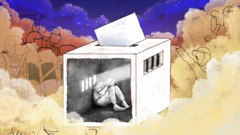**
"I thought I was going to die," Juan, a young Venezuelan activist, recounted his shocking experiences within the brutal prison system of Venezuela. At around 20 years old, he found himself ensnared by the government’s drastic measures to suppress dissent during the aftermath of the controversial presidential elections held on July 28. Following the announcement of Nicolás Maduro’s disputed victory, which has been labeled fraudulent by the Venezuelan opposition, protests erupted throughout the nation, leading to the mass arrest of hundreds, including Juan.
His account of being subjected to physical and psychological torture at the hands of Venezuelan security forces exposes the dark reality faced by many activists. Juan's allegations reflect broader patterns of abuse documented by various human rights organizations. Upon being released from custody in mid-November, after Maduro urged the judiciary to review wrongful detentions, he spoke with the BBC, detailing the unrelenting mistreatment inmates endured.
He described poor living conditions in the notorious Tocorón prison, where he and other detainees were housed under appalling circumstances, often deprived of food and subjected to regular beatings. With limited bathing facilities and scant time for exercise, Juan recalled the horrendous "concentration camp" environment fostered within the prison's dark confines.
The international community has expressed alarm over events following the elections. Reports from organizations like Foro Penal document rampant human rights violations, including unlawful arrests related to protests and public dissent against the regime. The Venezuelan government, however, deflects these claims, insisting that responses to unrest are justified, calling dissenters members of "terrorist" factions.
With the regime continuing to face scrutiny from the International Criminal Court over potential crimes against humanity, opposition leader Edmundo González, currently in exile, asserts his rightful claim to the presidency based on independent election tallies that contrast sharply with official government results. Juan and fellow prisoners cling to the hope of governmental change, aiming for a transition promised on January 10, 2025.
Despite his release, Juan grapples with the burden of guilt for leaving behind those still imprisoned. Nevertheless, he remains resolute, declaring, "I no longer fear the Venezuelan government," as he prepares to re-engage with activism to support González and advocate for the rights of all Venezuelans. His story serves as a chilling reminder of ongoing human rights abuses within the country and the resilience of those who continue to fight for justice.**
"I thought I was going to die," Juan, a young Venezuelan activist, recounted his shocking experiences within the brutal prison system of Venezuela. At around 20 years old, he found himself ensnared by the government’s drastic measures to suppress dissent during the aftermath of the controversial presidential elections held on July 28. Following the announcement of Nicolás Maduro’s disputed victory, which has been labeled fraudulent by the Venezuelan opposition, protests erupted throughout the nation, leading to the mass arrest of hundreds, including Juan.
His account of being subjected to physical and psychological torture at the hands of Venezuelan security forces exposes the dark reality faced by many activists. Juan's allegations reflect broader patterns of abuse documented by various human rights organizations. Upon being released from custody in mid-November, after Maduro urged the judiciary to review wrongful detentions, he spoke with the BBC, detailing the unrelenting mistreatment inmates endured.
He described poor living conditions in the notorious Tocorón prison, where he and other detainees were housed under appalling circumstances, often deprived of food and subjected to regular beatings. With limited bathing facilities and scant time for exercise, Juan recalled the horrendous "concentration camp" environment fostered within the prison's dark confines.
The international community has expressed alarm over events following the elections. Reports from organizations like Foro Penal document rampant human rights violations, including unlawful arrests related to protests and public dissent against the regime. The Venezuelan government, however, deflects these claims, insisting that responses to unrest are justified, calling dissenters members of "terrorist" factions.
With the regime continuing to face scrutiny from the International Criminal Court over potential crimes against humanity, opposition leader Edmundo González, currently in exile, asserts his rightful claim to the presidency based on independent election tallies that contrast sharply with official government results. Juan and fellow prisoners cling to the hope of governmental change, aiming for a transition promised on January 10, 2025.
Despite his release, Juan grapples with the burden of guilt for leaving behind those still imprisoned. Nevertheless, he remains resolute, declaring, "I no longer fear the Venezuelan government," as he prepares to re-engage with activism to support González and advocate for the rights of all Venezuelans. His story serves as a chilling reminder of ongoing human rights abuses within the country and the resilience of those who continue to fight for justice.**






















